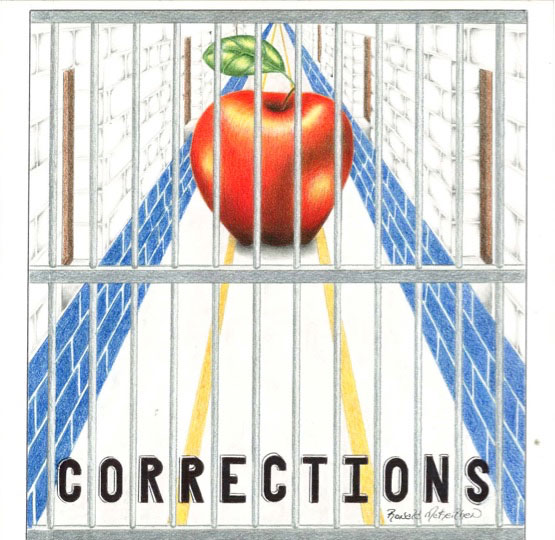Written by: Tiffany Westry
Need more info? Contact us
 This hand drawn logo was created by one of the inmates who participated in the production of the series.Faculty members at the University of Alabama at Birmingham are using educational entertainment to raise awareness about health issues in correctional settings through an eight-part radio drama series titled “Corrections.” The series was written and voiced by inmates at William E. Donaldson Correctional Facility in Bessemer, Alabama.
This hand drawn logo was created by one of the inmates who participated in the production of the series.Faculty members at the University of Alabama at Birmingham are using educational entertainment to raise awareness about health issues in correctional settings through an eight-part radio drama series titled “Corrections.” The series was written and voiced by inmates at William E. Donaldson Correctional Facility in Bessemer, Alabama.
The first of eight episodes premiered on Birmingham radio station WJLD AM 1400 on Oct. 22.
The next seven episodes of the series will air every Saturday for the next seven weeks at 7:30 a.m. Each 30-minute show will include one episode of the drama, followed by discussion with the program’s hosts.
“This may be the first program of its kind ever to be broadcast to the general public,” said Connie Kohler, producer of the series and professor emerita in the UAB School of Public Health. “While its main objective is to raise inmates’ awareness of common health problems in correctional settings, it is entertaining and novel, making it appealing to all audiences.”
According to the U.S. Department of Justice, nearly half of all state and federal prisoners and local jail inmates in the United States have a chronic health condition. These conditions include asthma, diabetes, heart disease, Alzheimer’s and hypertension. “Corrections,” while fictional, is based on the inmate’s perceptions of what the most prevalent health issues are within the Donaldson Correctional Facility.
For more than a year, a group of about 20 inmates were guided in their writing and performance by Lee Shackleford, assistant professor in the UAB College of Arts and Sciences Department of Theatre, and Dennis McLernon, professor and head of performance, also in the Department of Theatre. Caroline Durena, a doctoral student in the UAB School of Public Health, and Ashley Conoway, a doctoral student in the UAB School of Medicine, were also part of the team, which met with the inmates once a week to work on the project.
“Working closely with these men, listening to their stories and coaching their storytelling was an extraordinary opportunity,” said Shackleford. “Our goal from the start was to create a solid dramatic narrative that showcased the real concerns and experiences of the men who confront them day after day. Sometimes they would write scenes on whatever paper they could find and share them with the group the next time we met, these scenes frequently ended up in the final script. They're passionate about the story they want to tell to the world, and needed only a little guidance from me on how best to tell it.”
Once the scripts were written, each episode was recorded inside the facility with the help of Dennis McLernon. He also auditioned the inmates, casted each episode and supervised post-production editing.
“It was an amazing experience and humbling to work with these talented men who are working so hard to lead productive, creative lives,” said McLernon.
A number of studies have shown participation in educational and creative activities decreases the likelihood that inmates will find themselves back in prison after they are released, and increases their motivation to avoid trouble while in prison. The broadcast is available to any inmate who has access to a radio. Kohler says the program also promotes a culture of health consciousness as it entertains and educates. Those who participated in the production of the series have already noted its positive impact.
| Once the scripts were written, each episode was recorded inside the facility with the help of Dennis McLernon. He also auditioned the inmates, casted each episode and supervised post-production editing. |
“The inmates who worked on the project tell us it has helped with their self-esteem,” Kohler said. “It is also beneficial because it gives them something to look forward to each week, and the assignments in between provide something to do outside of their daily routine.”
The group used Crowdfunding at UAB, a fundraising platform to help drive support for projects and initiatives by UAB students and faculty, to raise money for post-production at a local professional audio studio.
Kohler says the inmates have already expressed interest in creating a second series. She hopes to make the drama available to other prisons, as well as to people around the county doing tuberculosis education.
UAB’s collaboration with Donaldson extends nearly 30 years, with the creation of the UAB-Donaldson Lecture Series in 1987. UAB faculty and staff members give talks at the prison on a variety of topics on the first and third Tuesdays of the month from September through May. The lecture series was the subject of a recent documentary, “The Prison’s Professors.”
The next seven episodes of “Corrections” can be streamed live online through WJLD’s website, www.wjldradio.com, every Saturday at 7:30 a.m.